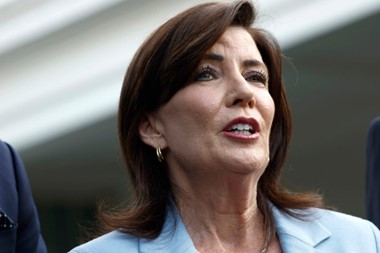
Gov. Hochul Considers Adjusting New York's Ambitious Climate Law Amid Rising Costs and Implementation Challenges
New York Governor Kathy Hochul is weighing potential adjustments to the state's landmark Climate Leadership and Community Protection Act (CLCPA), as business groups and political figures pressure for a relaxation of its ambitious goals. The CLCPA, enacted in 2019, mandates that New York obtain 70% of its electricity from renewable energy by 2030 and significantly reduce greenhouse gas emissions. However, recent developments suggest these targets may be increasingly difficult to achieve.
In a recent TV interview, Governor Hochul acknowledged the rising costs associated with the CLCPA's mandates, expressing concern about the financial impact on New York families. "The goals are still worthy, but we have to think about the collateral damage of these decisions," Hochul remarked, hinting at the possibility of re-evaluating the state's approach.
The state Public Service Commission (PSC) recently admitted that the 70% renewables target is unlikely to be met before 2033, delaying the original timeline by three years. This admission, combined with a critical audit from State Comptroller Thomas DiNapoli and warnings from the New York Independent System Operator (NYISO) about potential blackouts, has fueled opposition to the CLCPA.
Leading the pushback are the Business Council of New York State and state Senator Tom O'Mara, who argue for a complete reassessment of the law's mandates. O'Mara, a longtime opponent of the CLCPA, labeled the law as "utopian" and criticized it for lacking a thorough cost-benefit analysis.
Despite these challenges, some environmental advocates, including Cornell University climate scientist Robert Howarth, strongly oppose any rollback of the CLCPA. Howarth, a member of the state's Climate Action Council, emphasized the importance of continuing the state's trajectory toward reducing emissions and transitioning to renewable energy. He warned against the influence of business interests that prioritize short-term gains over long-term environmental sustainability.
Governor Hochul's consideration of adjustments to the CLCPA comes after several setbacks in the implementation of the law, including project cancellations and public resistance to the transition to electric vehicles. The state is also grappling with rising energy needs, such as those anticipated from the planned semiconductor plant by Micron near Syracuse.
While Hochul has previously shown some willingness to modify the law, particularly concerning methane emission accounting, she faced significant backlash from environmental groups. This time, the governor's statements suggest a careful balancing act between maintaining the state's climate goals and addressing economic and logistical realities.
As New York navigates these challenges, the debate over the CLCPA's future highlights the broader tension between ambitious climate action and the practicalities of implementation, particularly in the face of rising costs and economic pressures.